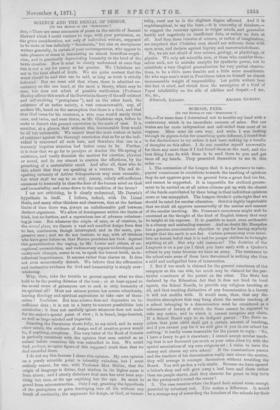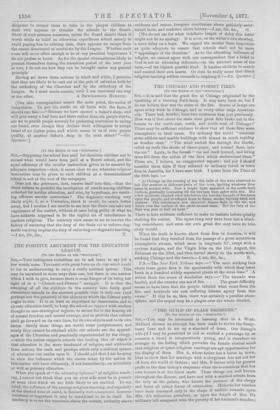SCHOOL FEES.
(TO THE EDITOR OF THE SPECTATOR.")
SIR,—For some time I determined not to trouble my head with a controversy which is no immediate concern of mine. But our brains are far more independent and self-willed than most of us suppose. Mine went its own way, and while I was looking through its pigeon-holes for something quite different, I found that
in fiat disobedience to my orders it had been making up a bundle of thoughts on this affair. I do not consider myself answerable for them any more than if I had found them on the road, and the
best thing lean do with them is to send them to you and get them off my hands. They presented themselves to me in this order :- 1. The contention of the League that it is a grievance to rate- payers' consciences to contribute towards the teaching of opinions they do not approve goes in its general form a great deal too far, and cannot be supported. It is impossible for civilized govern- ment to be carried on at all unless citizens put up with the chance of the funds contributed by them being in their individual opinions more or less misapplied. The League thinks it quite right that we should be rated for secular education. But it is highly improbable that we shall all approve unreservedly of the matter and manner of the secular teaching. Mr. Freeman's conscience might well be exercised at the thought of the kind of English history that may be taught at his expense. It is possible to teach even arithmetic in a clumsy and misleading manner. And no doubt Mr. Hampden has a genuine conscientious objection to pay for having anybody taught that the earth ie not flat. Certain persons may even enter- tain an honest belief that it is bad for pauper children to be taught
anything at all. But why add instances? The doctrine of the Leaguers is on a par (as I think you have said) with a Quaker's
refusal to pay taxes because we have an army. The resistance to the school-rate some of them have threatened is nothing else than a mild and undignified form of insurrection.
2. But if too much is claimed for the general conscience of the ratepayer on the one side, too much may be claimed for the par- ticular conscience of the parent on the other. The State has declared by the Education Act that it does not bind its local agents, the School Boards, to provide any religious teaching at all, and that teaching distinctive of any denomination is a luxury it will not meddle with. It would seem, then, that any dis- tinctive atmosphere that may hang about the secular teaching of a school belonging to a denomination must be considered as a refinement of luxury of which the State cannot be expected to take any notice, and to which it cannot recognize any claim.
If a School Board says to an indigent parent : The State re-
quires that your child shall get a certain amount of teaching, and if you cannot pay for it we will give it you in our school for nothing,' it hardly seems reasonable for the parent to reply No, I have a fancy to get it elsewhere ; I cannot accept secular teach- ing that is not flavoured Oa much as your rules allow it) with the special associations of my own religious set ; I claim to have the money and choose my own school.' If the conscientious parent and the teachers of his denomination really care about the matter, they will arrange it amongst themselves without troubling the Board. You will pardon a rude simile. Because we have opened a baker's shop and will give away a loaf here and there rather than see people starve, shall they clamour for pence to buy tarts at the pastrycook's round the corner? 3. The case remains where the Board finds school room enough provided by voluntary zeal. This makes a difference. It would be a strange way of rewarding the founders of the schools for their
diligence to compel them to take in the pauper children at their own expense or transfer the schools to the Board. Short of such extreme measures, unless the Board should think it worth while to build an otherwise superfluous school merely to avoid paying fees to existing ones, there appears no escape from the course denounced as mortal sin by the League. Whether such cases will occur often enough to be of any practical importance I do not profess to know. As for the special circumstances likely to present themselves during the transition period of the next year or two, I do not see how they can be brought under any general principle.
Having set down these notions in black and white, I perceive that they are likely to be cast out of the pale of salvation both by the orthodoxy of the Churches and by the orthodoxy of the League. So I must needs remain, until I am converted one way
[Our able correspondent misses the main point, the nodu,s of compulsion. To put his simile on all fours with the facts, it should run this :—" Because we have opened a baker's shop, and will give away a loaf here and there rather than see people starve, are we to punish people severely for preferring starvation to eating our bread, even though they declare their willingness to accept bread of no higher price, and which seems to us of even poorer quality, at another baker's shop in the next street? "—En. Spectator.]



































 Previous page
Previous page